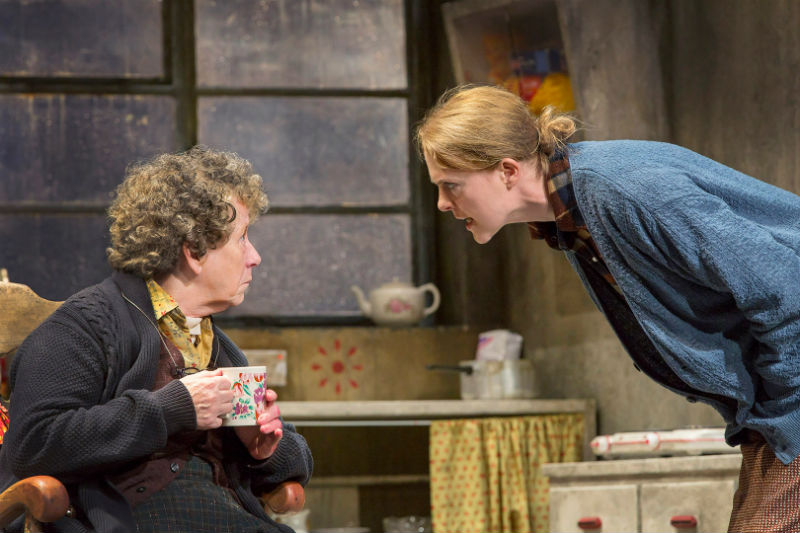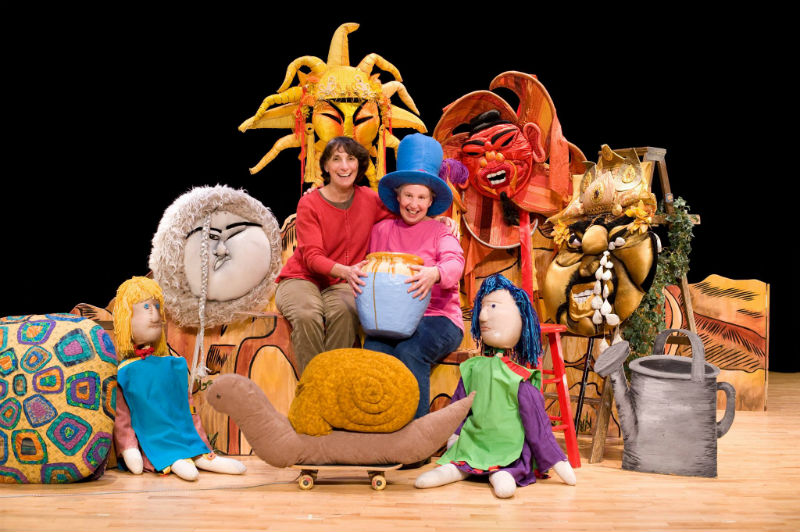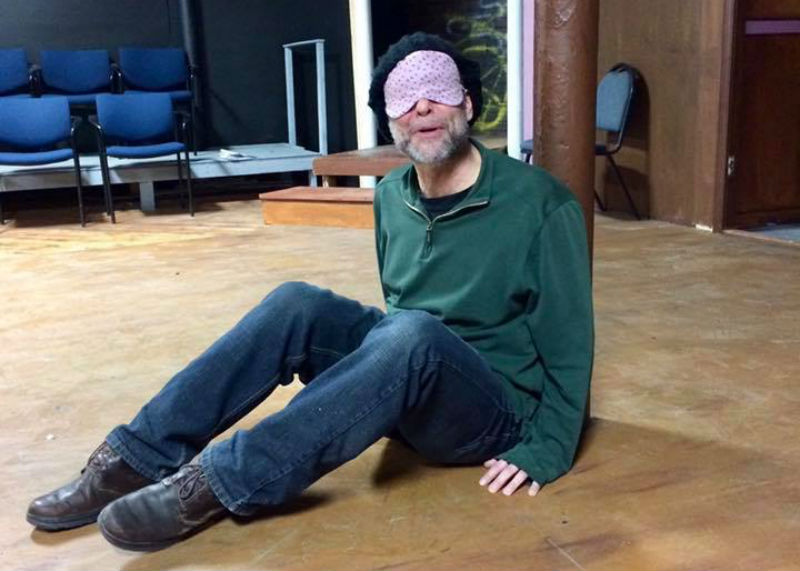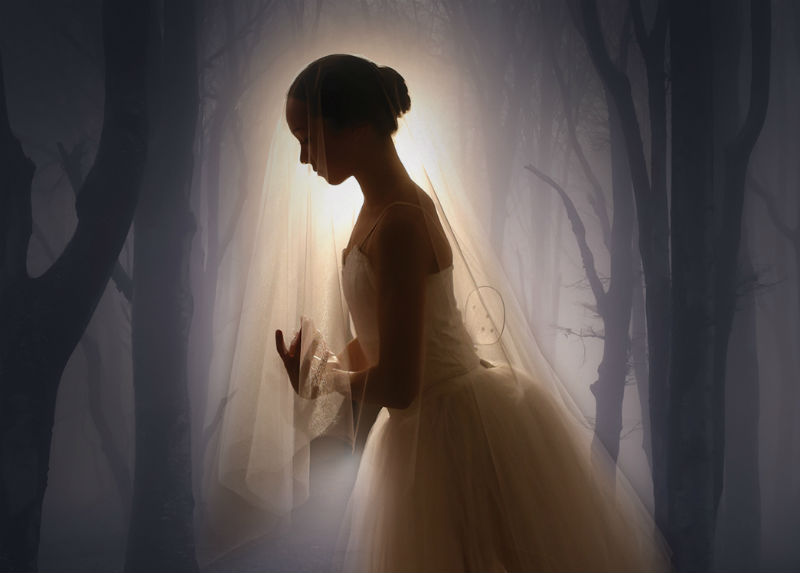Theatre Nova's "Clutter" explores the traps of false memories

Much like a plaster casting mold, most modern American plays squeeze themselves into ready-made stylistic and thematic models that have a good track record. The styles can often be pinpointed back to one or two particularly significant behemoths that are scattered throughout the history of the American theater. One such theatrical prototype is the Memory Play. It was initially popularized by playwright Tennessee Williams in the preface for his 1945 drama The Glass Menagerie. As Williams described it, “When a play employs unconventional techniques, it is not, or certainly shouldn’t be, trying to escape its responsibility of dealing with reality, or interpreting experience, but is actually or should be attempting to find a closer approach, a more penetrating and vivid expression of things as they are.” The playwrights Pinter (Betrayal), Friel (Dancing at Lughnasa), and Leonard Jr. (The Diviners) are all known for their Memory Plays. Each examined different subjects, but all used the power of characters retelling their memories and dreams to exaggerate details in order to increase the emotional impact of those stories. Clutter, the new show at Theatre Nova written by Brian Cox, is a world premiere Memory Play about the traps of false memories that we set for ourselves by taking part in nostalgic rumination.
Let's Play: Skyline's "The Diviners," Thurston Players' "Game On!," Pass the Hat's "The Know Gun Show" & Pioneer's "Wizard of Oz"

It sometimes feels like the only things more popular than U-M football in Ann Arbor are theater productions. From major UMS events at the Power Center to Kickshaw Theatre's experimental "Here's to You, Here's to Me" at local bars, the stage -- wherever it may be -- is always alive in A2.
The community and school theater scene is especially active, and this weekend alone there are four plays opening: Tappan Players' Hello, Dolly! (full Pulp feature here), the Skyline Theatre Arts Program's The Diviners, the Thurston Players' original play Game On!, and Pass the Hat Promotion's The Know Gun Show. And next month, the Pioneer Theatre Guild presents The Wizard of Oz.
Below are descriptions of the shows provided by the theaters and production companies.
Cheers! Kickshaw Theatre's "Here's to You, Here's to Me" is a play masquerading as a drinking party (& vice-versa)
Since it began in January, Kickshaw Theatre is known for putting together unconventional productions. Lynn Lammers’ first show, The Electric Baby, was performed in the equivalent of a warehouse and centered on a woman grieving the death of her grown daughter. The show begins when the woman storms off into traffic and causes a cab to crash into a pole.
In contrast, in the current production, Here's to You, Here's to Me, Kickshaw is hosting a 30-minute drinking party at various local bars around Ann Arbor.
To clarify, this particular "party" is devised by the actors, but this is still as informal as theater can get. “The show started with just the concept of toasting, lots of research, and a discussion about what people want/need from theater at this moment in time,” Lammers told Pulp in a recent interview.
Which explains the improv, the jam sessions, and the alcohol. Oh, the alcohol. For really, what would a show about toasting be if the actors and the audience didn’t all have copious amounts of alcohol on hand throughout?
All Dolled Up: Tappan Players’ “Hello, Dolly!"

The current political climate impacts us in ways big and small -- like factoring into the decision of whether or not to ditch the “Motherhood March” number in Tappan Players’ new production of Hello, Dolly
“We were going to cut it for time,” said the show’s co-producer Lisa Richardson. “But after the Women’s March, we decided to put it back in.”
Tappan Players is a student-run theater company that stages one big musical each year. An outgrowth of the Burns Park Players, TP is now in its 27th year, and Hello, Dolly features about 80 Tappan Middle School students in the cast, more than 30 in the crew, and 15 in the orchestra. The company was born out of a desire to give kids who age out of Burns Park Players a chance to keep learning about theater and be part of a show.
“There’s a certain amount of magic that happens,” said Richardson. “When I’ve made sure the director (Anna Martinsen) has what she needs, and the business part gets done, I spend a good chunk of time sitting in the audience during rehearsals. … And watching these kids who started out shy and unfamiliar with the process start blossoming right before your eyes -- I think of it as a magic place, where kids get to be creative and free, and no one’s judging them for it.”
Integrated Identities: "The Beauty Queen of Leenane" at the Power Center

When two ordinary, scribbled-on pieces of paper in an envelope magically morph into a miserable woman’s key to happiness -- and your heart pounds as you hawkishly, breathlessly watch the precarious letter being set down, picked up, walked around the stage, and handed off -- that’s the power of live theater.
But it takes pros to achieve that level of emotionally tense stage magic, and when it comes to interpreting Martin McDonagh’s work, there may be none on Earth that can match Ireland’s renowned Druid Theatre Company, which performed The Beauty Queen of Leenane March 9-11 at the Power Center, courtesy of University Musical Society.
Here’s to Collaboration: Behind the Scenes of the Kickshaw Lab

Last weekend, I had the opportunity to sit in on a rehearsal of Kickshaw Theatre’s new devised work: Here’s to You, Here’s to Me. I work with the organization, but I’ve never been in a rehearsal room where “devising” is happening. It was awesome.
After a group warm-up, the actors took the stage and performed the material they have developed so far. The story is still being shaped (and may change between now and the performance), but it’s loosely framed as a party of friends, celebrating and exploring the ritual of toasting. The show includes original songs and dialogue that the cast has collectively written in rehearsal. One song, a toast to a cast member’s mom, was re-worked during rehearsal. The ensemble re-ordered verses, changed lyrics, and improvised musical riffs and harmonies. In the end, the song came out sounding like a 1980s rock anthem!
Wild Swan Theater's family concert truly is "An Afternoon of Ann Arbor’s Best" -- and its plays are pretty fun, too

Sandy Ryder represents some of the best things about Ann Arbor. She's someone who came to town for school, never left, and then went on to create businesses and good works that she has generously shared with the community for decades.
After graduating from the University of Michigan with a degree in theater, Ryder taught, worked as a clown and a mime, and did improv with a children’s theater group. In 1979, she started Say Cheese Cheesecakes bakery (which closed in 2006 under different owners). Then in 1980, she cofounded Wild Swan Theater with Hilary Cohen.
Over the past 27 years, Wild Swan has distinguished itself as a place for all people, especially children with disabilities.
“My favorite thing is to have everything accessible -- workshops, traveling shows, everything," Ryder said. "We have ASL shadowed into the show, kids with visual impairments can come to a touch tour on stage. Everyone can share the experience together, everyone can enjoy the play.”
Ellipsis Theatre fought a plague throughout its house to produce Shakespeare's "Twelfth Night"

Ellipsis Theatre’s production of Twelfth Night has been beset by a tragedy of the sort usually only seen performed on the stage of Shakespearean prose -- namely, a plague.
Many of the actors caught serious cases of the flu, to the point where the show did not go on during the first weekend of its run and was pushed back a full week. The night I saw the show, one actor (playing Sir Toby) had just joined the cast in the last three days and another actor who was playing Orsino was doubling for Sir Andrew since the original Sir Andrew had turned green just hours before.
Such extreme changes in performance schedules will almost certainly affect audience levels for the run, which is a shame; I strongly recommend that you go see Twelfth Night this upcoming weekend if you can, assuming that the cast has not all fainted into comas.
"Giselle" is a demanding work for any dancer, but Ballet Chelsea’s students are thriving in it

Because of the weight of its subject matter and the demands of its production, Giselle is seldom tackled in student performance. Yet, here is Ballet Chelsea, a relatively new pre-professional company, mounting a full-length Giselle on March 11 and 12 at the CHS Performing Arts Complex.
Giselle is serious business -- and I mean that in a couple of ways.
First, there’s the matter of its plot. Giselle, a young peasant girl, falls in love with Albrecht, whom she meets when his hunting party passes near her village. He promises to marry her, but before Act I is over she has learned the extent of his deception: he is not just some hunter, he is a duke, and furthermore, he is already betrothed to Bathilde. Giselle goes mad and dies of a broken heart -- both literal and figurative (the idea that she has a weak heart and should not dance so much was planted early in the act).
In Act II, Giselle has become a Wili, the spirit of a young woman jilted at the altar. She is not alone; there’s a whole gang of Wilis and they are out for revenge on the men who betrayed them. Their queen orders Giselle to dance with Albrecht until he dies of exhaustion. Instead, Giselle stays with him until the dawn, when Wilis lose their power, thus saving his life. She returns to the grave and he, presumably, to a life of guilt and remorse.
So the story is a far cry from the fluffy stuff of, say, The Nutcracker. Furthermore, it is a formidable production to tackle.
Ann Arbor Civic Theater’s “Almost, Maine” offers 9 emotional small-town snapshots

John Cariani’s Almost, Maine is set in a fictional town so named because it’s so far north that it’s almost in Canada. It’s distant from the urban chatter of Boston or Montreal, but that physical distance also suggests the emotional distance that the play’s characters have to bridge.
“Distance is a big issue in the play,” said Elizabeth Docel, who plays two parts in the production. “The town is distant from everywhere and the play is about the distance between people.”
The Ann Arbor Civic Theater is presenting Cariani’s play March 9-12 at the Arthur Miller Theatre. It’s a play that has won wide support at regional and school theaters for its mix of comedy, drama, and a little magic realism.
“When I first read the play, it was so different from what I usually do,” said director Kat Walsh. “I usually do Shakespeare and works centering on social justice, and I found this play simple, sweet, and quirky.”
As she looked deeper into the play she also found a running theme.


































